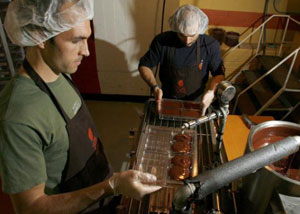Production Manager
Tasks & duties

Production managers may do some or all of the following:
-
work with factory management and staff to set production goals and budgets
-
make sure production goals are reached and budgets are kept
-
work out the most efficient methods of producing goods
-
make decisions on the maintenance or replacement of factory equipment
-
order materials and supplies
-
direct the activities of production staff
-
write reports on production results and audit production systems
-
evaluate the production process and make changes to improve the quality and speed of production
-
set quality standards and check these are being maintained
-
oversee safety standards in the factory
-
meet and liaise with customers
-
plan and develop new products and production processes
-
assist with production staff's professional development and training
Specialisations
In small factories, production managers may also be involved in human resources and staff management. In larger factories, some production managers may specialise in production planning; organising timetables and the flow of materials to ensure the smooth running of a factory.
Skills & knowledge

Production managers need to have:
-
knowledge of their company's products, production processes and materials
-
the ability to keep up to date with production methods and technology
-
knowledge of industrial relations
-
an understanding of customer requirements
-
basic computer skills
-
finance and budgeting skills
-
staff management skills, including good communication skills
-
organisational and planning skills
-
decision-making ability
-
problem-solving skills
-
accounting and stock management skills
Entry requirements
To become a production manager you need to have experience working in a factory, especially in a supervisory role.
Secondary education
There are no specific secondary education requirements, but a tertiary entrance qualification is preferred by some employers. Useful subjects include maths and computers.
Tertiary education
Engineering, manufacturing technology or business qualifications may be required by some employers. Other tertiary qualifications may be useful for specific production areas, such as a food technology qualification for managing food production lines.
Training on the job
Many skills are gained on the job. Production managers may attend courses and workshops on accounting and personnel management, or manufacturing.
Useful Experience
Work involving computers, accounting, management or engineering may also be useful.
Related courses
Business Management
Industrial Engineering
Plastics Processing Technology
Project Management
Quality Management
For more information, please refer to Career Services.
Document Actions
